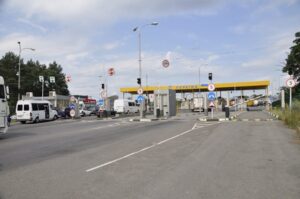
Prime Minister of the United Kingdom of Great Britain and Northern Ireland Boris Johnson, after the meeting of the countries of the British Commonwealth, expressed confidence that the Ukrainian issue will be one of the main issues at the next meeting of the G7 representatives.
“It has been a fantastic few days in Kigali. We are working together with our Commonwealth friends to stimulate trade and investment, advance the green industrial revolution and find solutions to the crisis in Ukraine that will be the focus of the G7 in the coming days,” he wrote in Twitter Saturday night.
As reported, on June 24, Johnson said that the countries of the British Commonwealth together will be able to achieve a reduction in world food prices.
“Global prosperity and stability are under threat – Commonwealth countries bear the brunt of Putin’s recklessness in Ukraine. Together we can bring down food prices and get the world economy back on track while standing up for the freedoms we all believe in,” he wrote.

By decrees of June 24, President of Ukraine Volodymyr Zelensky appointed Ukraine’s ambassadors to the Republic of Tajikistan and New Zealand.
The relevant decrees No. 444/2022 and No. 445/2022 are published on the website of the head of state.
Valery Evdokimov has been appointed Ambassador to Tajikistan.
In turn, Vasyl Miroshnichenko, Ukraine’s Ambassador to Australia, has been appointed concurrent Ambassador to New Zealand.

Germany will allocate EUR1 billion in grant funding to Ukraine for priority government spending, the corresponding agreement between the governments was signed on June 24, Minister of Finance of Ukraine Serhiy Marchenko told
“I thank my friend German Finance Minister Christian Lindner for the speed in implementing this important decision. This financial support is more important than ever and will bring our victory closer,” the head of the Ukrainian Ministry of Finance wrote on Facebook.
Earlier it was reported that these funds from Germany, presumably, will be provided through a special account administered by the International Monetary Fund (IMF).
In April 2022, the IMF decided to create an administrative account for crediting funds as part of the Special Drawing Rights (SDR) from donor countries in favor of Ukraine. All funds raised using this account should be used to maintain the financial stability of Ukraine in the form of grants or credits (loans).

From June 27, only trucks weighing more than 7.5 tons and scheduled buses will pass through the Yagodin-Dorogusk checkpoint to reduce queues at the border, the State Border Service of Ukraine reports.
“Cargoes up to 7.5 tons and light vehicles will not be processed. Empty trucks will move in separate traffic lanes, while fuel trucks will continue to be processed in the first place,” the message on Facebook said.

The Antimonopoly Committee of Ukraine has allowed the state-owned Ukrposhta to buy Alpari Bank.
“The Antimonopoly Committee of Ukraine granted Ukrposhta permission to acquire Alpari Bank. In conditions when many bank branches are closed, there is no connection in many places, and only Ukrposhta operates there, it is very important that modern banking services appear there. And Ukrposhta” he will definitely do it,” CEO of Ukrposhta Igor Smelyansky wrote on his Telegram channel on Friday.
He also said that this decision would save the country up to UAH 10 billion in three to four years.
“We thank the Antimonopoly Committee for the positive decision, we thank those who supported us, and we are preparing the last step – the decision of the NBU,” Smelyansky said.
As reported, in 2021, Ukrposhta submitted documents to agree on a deal to buy Alpari Bank from the Antimonopoly Committee of Ukraine and the National Bank of Ukraine.
According to the NBU, as of January 1, 2022, the sole shareholder of Alpari Bank was a UAE citizen Bakhtari Hedayat-Allah Musa. According to the central bank, as of March 1, 2022, the bank is solvent and has assets in the amount of UAH 221.9 million.

Agrarians of Odessa and Mykolaiv regions harvested 92.1 thousand tons of early grain and leguminous crops on a total area of 42.2 thousand hectares by June 24, according to the website of the Ministry of Agrarian Policy and Food of Ukraine on Friday. It is specified that a total of 90 thousand tons of winter barley from 41.1 thousand hectares and 2 thousand tons of winter wheat from 1.2 thousand hectares were threshed.
Accordingly, the average yield of winter barley was 21.9 c/ha, winter wheat – 17.8 c/ha.
The agency clarified that on the same date last year, the harvesting of winter crops had not yet begun.
“Despite the constant shelling, people and special equipment also work during the curfew. The necessary permission can be obtained from the district military administrations,” the Ministry of Agrarian Policy summed up in the message.